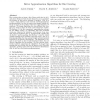Free Online Productivity Tools
i2Speak
i2Symbol
i2OCR
iTex2Img
iWeb2Print
iWeb2Shot
i2Type
iPdf2Split
iPdf2Merge
i2Bopomofo
i2Arabic
i2Style
i2Image
i2PDF
iLatex2Rtf
Sci2ools
131
click to vote
SODA
2001
ACM
2001
ACM
Better approximation algorithms for bin covering
Bin covering takes as input a list of items with sizes in (0 1) and places them into bins of unit demand so as to maximize the number of bins whose demand is satis ed. This is in a sense a dual problem to the classical one-dimensional bin packing problem, but has for many years lagged behind the latter in terms of the quality of the best approximation algorithms. We design algorithms for this problem that close the gap, both in terms of worst- and average-case results. We present (1) the rst asymptotic approximation scheme for the o ine version, (2) algorithms that have bounded worst-case behavior for instances with discrete item sizes and expected behavior that is asymptotically optimal for all discrete \perfect-packing distributions" (ones for which optimal packings have sublinear expected waste), and (3) a learning algorithm that has asymptotically optimal expected behavior for all discrete distributions. The algorithms of (2) and (3) are based on the recently-developed online...
Related Content
| Added | 31 Oct 2010 |
| Updated | 31 Oct 2010 |
| Type | Conference |
| Year | 2001 |
| Where | SODA |
| Authors | János Csirik, David S. Johnson, Claire Kenyon |
Comments (0)

